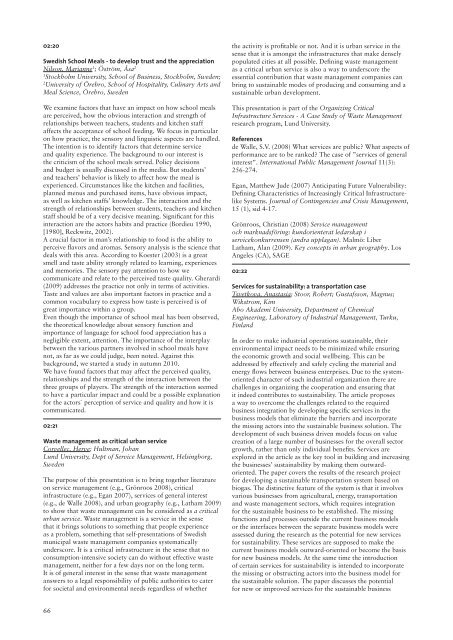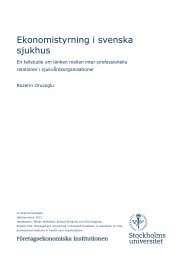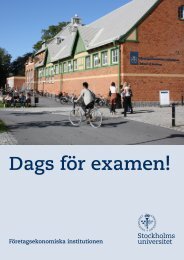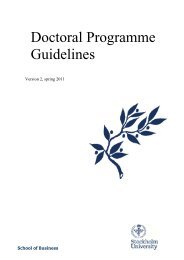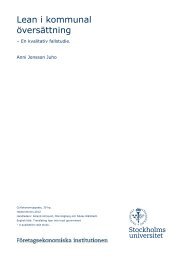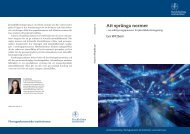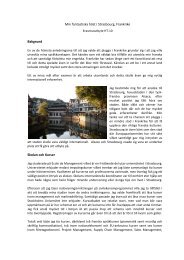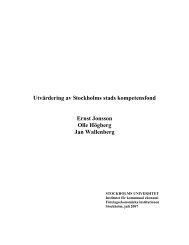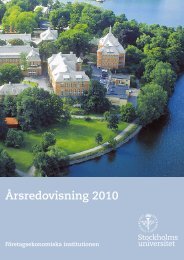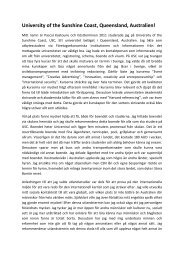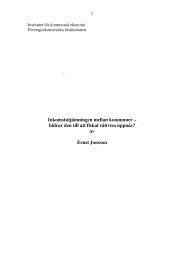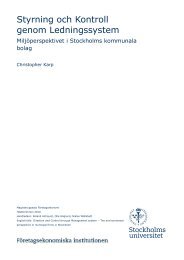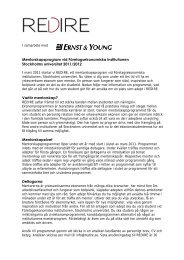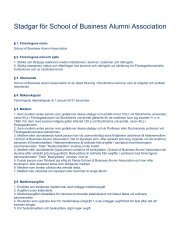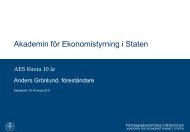Download full programme and abstract book pdf 1.6
Download full programme and abstract book pdf 1.6
Download full programme and abstract book pdf 1.6
You also want an ePaper? Increase the reach of your titles
YUMPU automatically turns print PDFs into web optimized ePapers that Google loves.
02:20<br />
Swedish School Meals - to develop trust <strong>and</strong> the appreciation<br />
Nilson, Marianne 1 ; Öström, Åsa 2<br />
1 Stockholm University, School of Business, Stockholm, Sweden;<br />
2 University of Örebro, School of Hospitality, Culinary Arts <strong>and</strong><br />
Meal Science, Örebro, Sweden<br />
We examine factors that have an impact on how school meals<br />
are perceived, how the obvious interaction <strong>and</strong> strength of<br />
relationships between teachers, students <strong>and</strong> kitchen staff<br />
affects the acceptance of school feeding. We focus in particular<br />
on how practice, the sensory <strong>and</strong> linguistic aspects are h<strong>and</strong>led.<br />
The intention is to identify factors that determine service<br />
<strong>and</strong> quality experience. The background to our interest is<br />
the criticism of the school meals served. Policy decisions<br />
<strong>and</strong> budget is usually discussed in the media. But students’<br />
<strong>and</strong> teachers’ behavior is likely to affect how the meal is<br />
experienced. Circumstances like the kitchen <strong>and</strong> facilities,<br />
planned menus <strong>and</strong> purchased items, have obvious impact,<br />
as well as kitchen staffs’ knowledge. The interaction <strong>and</strong> the<br />
strength of relationships between students, teachers <strong>and</strong> kitchen<br />
staff should be of a very decisive meaning. Significant for this<br />
interaction are the actors habits <strong>and</strong> practice (Bordieu 1990,<br />
[1980], Reckwitz, 2002).<br />
A crucial factor in man’s relationship to food is the ability to<br />
perceive flavors <strong>and</strong> aromas. Sensory analysis is the science that<br />
deals with this area. According to Koester (2003) is a great<br />
smell <strong>and</strong> taste ability strongly related to learning, experiences<br />
<strong>and</strong> memories. The sensory pay attention to how we<br />
communicate <strong>and</strong> relate to the perceived taste quality. Gherardi<br />
(2009) addresses the practice not only in terms of activities.<br />
Taste <strong>and</strong> values are also important factors in practice <strong>and</strong> a<br />
common vocabulary to express how taste is perceived is of<br />
great importance within a group.<br />
Even though the importance of school meal has been observed,<br />
the theoretical knowledge about sensory function <strong>and</strong><br />
importance of language for school food appreciation has a<br />
negligible extent, attention. The importance of the interplay<br />
between the various partners involved in school meals have<br />
not, as far as we could judge, been noted. Against this<br />
background, we started a study in autumn 2010.<br />
We have found factors that may affect the perceived quality,<br />
relationships <strong>and</strong> the strength of the interaction between the<br />
three groups of players. The strength of the interaction seemed<br />
to have a particular impact <strong>and</strong> could be a possible explanation<br />
for the actors´ perception of service <strong>and</strong> quality <strong>and</strong> how it is<br />
communicated.<br />
02:21<br />
Waste management as critical urban service<br />
Corvellec, Herve; Hultman, Johan<br />
Lund University, Dept of Service Management, Helsingborg,<br />
Sweden<br />
The purpose of this presentation is to bring together literature<br />
on service management (e.g., Grönroos 2008), critical<br />
infrastructure (e.g., Egan 2007), services of general interest<br />
(e.g., de Walle 2008), <strong>and</strong> urban geography (e.g., Latham 2009)<br />
to show that waste management can be considered as a critical<br />
urban service. Waste management is a service in the sense<br />
that it brings solutions to something that people experience<br />
as a problem, something that self-presentations of Swedish<br />
municipal waste management companies systematically<br />
underscore. It is a critical infrastructure in the sense that no<br />
consumption-intensive society can do without effective waste<br />
management, neither for a few days nor on the long term.<br />
It is of general interest in the sense that waste management<br />
answers to a legal responsibility of public authorities to cater<br />
for societal <strong>and</strong> environmental needs regardless of whether<br />
66<br />
the activity is profitable or not. And it is urban service in the<br />
sense that it is amongst the infrastructures that make densely<br />
populated cities at all possible. Defining waste management<br />
as a critical urban service is also a way to underscore the<br />
essential contribution that waste management companies can<br />
bring to sustainable modes of producing <strong>and</strong> consuming <strong>and</strong> a<br />
sustainable urban development.<br />
This presentation is part of the Organizing Critical<br />
Infrastructure Services - A Case Study of Waste Management<br />
research program, Lund University.<br />
References<br />
de Walle, S.V. (2008) What services are public? What aspects of<br />
performance are to be ranked? The case of ”services of general<br />
interest”. International Public Management Journal 11(3):<br />
256-274.<br />
Egan, Matthew Jude (2007) Anticipating Future Vulnerability:<br />
Defining Characteristics of Increasingly Critical Infrastructurelike<br />
Systems. Journal of Contingencies <strong>and</strong> Crisis Management,<br />
15 (1), sid 4-17.<br />
Grönroos, Christian (2008) Service management<br />
och marknadsföring: kundorienterat ledarskap i<br />
servicekonkurrensen (<strong>and</strong>ra upplagan). Malmö: Liber<br />
Latham, Alan (2009). Key concepts in urban geography. Los<br />
Angeles (CA), SAGE<br />
02:22<br />
Services for sustainability: a transportation case<br />
Tsvetkova, Anastasia; Stoor, Robert; Gustafsson, Magnus;<br />
Wikstrom, Kim<br />
Abo Akademi University, Department of Chemical<br />
Engineering, Laboratory of Industrial Management, Turku,<br />
Finl<strong>and</strong><br />
In order to make industrial operations sustainable, their<br />
environmental impact needs to be minimized while ensuring<br />
the economic growth <strong>and</strong> social wellbeing. This can be<br />
addressed by effectively <strong>and</strong> safely cycling the material <strong>and</strong><br />
energy flows between business enterprises. Due to the systemoriented<br />
character of such industrial organization there are<br />
challenges in organizing the cooperation <strong>and</strong> ensuring that<br />
it indeed contributes to sustainability. The article proposes<br />
a way to overcome the challenges related to the required<br />
business integration by developing specific services in the<br />
business models that eliminate the barriers <strong>and</strong> incorporate<br />
the missing actors into the sustainable business solution. The<br />
development of such business driven models focus on value<br />
creation of a large number of businesses for the overall sector<br />
growth, rather than only individual benefits. Services are<br />
explored in the article as the key tool in building <strong>and</strong> increasing<br />
the businesses’ sustainability by making them outwardoriented.<br />
The paper covers the results of the research project<br />
for developing a sustainable transportation system based on<br />
biogas. The distinctive feature of the system is that it involves<br />
various businesses from agricultural, energy, transportation<br />
<strong>and</strong> waste management sectors, which requires integration<br />
for the sustainable business to be established. The missing<br />
functions <strong>and</strong> processes outside the current business models<br />
or the interfaces between the separate business models were<br />
assessed during the research as the potential for new services<br />
for sustainability. These services are supposed to make the<br />
current business models outward-oriented or become the basis<br />
for new business models. At the same time the introduction<br />
of certain services for sustainability is intended to incorporate<br />
the missing or obstructing actors into the business model for<br />
the sustainable solution. The paper discusses the potential<br />
for new or improved services for the sustainable business


